Here are 10 things you should know about Alice Faye, born 109 years ago today. She was a huge star who all but pulled the plug on her career before the age of 40.
Tag: Tony Martin
10 Things You Should Know About Adele Jergens
Here are 10 things you should know about Adele Jergens, born 106 years ago today. In a 21-year career, she enjoyed success on Broadway and in pictures, radio and television.
Cladrite Radio Remembers
We suspect we’re not alone in experiencing just the slightest bit of melancholia this time of year.
Perhaps it’s an age thing: We’ve had mixed feelings about birthdays, too, ever since we turned thirty. Before that, both our birthday and New Year’s Eve were purely joyous occasions, but nowadays, both occasions engender bittersweet feelings.
The folks at Turner Classic Movies must feel the same way as they prepare their annual video tribute to those movie makers who have passed on in the previous year.
Nowadays, there aren’t so many folks from the Cladrite Era found among the departed—with each passing year, there are fewer left to leave us—but the 2012 tribute does honor a few names from the old days, including Phyllis Thaxter, Ann Rutherford
, Tony Martin
, and Celeste Holm
.
Past paper: A Warner Baxter bonus
We’ve come across any number of theatre flyers over the years (including the drive-in flyers from the late 1950s featured in this post), but we’ve never encountered one quite like this one.
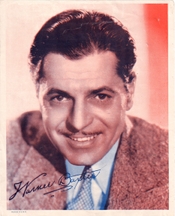 |
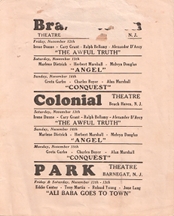 |
At first glance, it appears to be simply a promotional headshot of once-popular leading man Warner Baxter with a printed autograph (which is surprisingly convincing, by the way—we were briefly fooled into thinking we’d scored an genuine autographed photo of Baxter for a mere five smackers), but turn the photo over, and voila—it’s a programming schedule for three different New Jersey theatres. Part of the name is missing from the top theatre, but a little research has us convinced it was the Branchville Theater in Branchville, New Jersey. All we’ve been able to ascertain about the Branchville is that it was listed in the Film Daily Yearbook in 1944 and 1951, and on one weekend in 1937, they screened The Awful Truth, with Irene Dunne and Cary Grant, Angel with Marlene Dietrich, Herbert Marshall, and Melvyn Douglas, and Conquest, starring Greta Garbo and Charles Boyer.
How much earlier than that the theatre was in operation or when it closed, we can’t say. But we’d pay good money to see those three pictures at a small-town bijou like the Branchville, of that you can be sure.
Also featured on this promotional photo is the Colonial Theatre in Beach Haven, New Jersey. (Did you know that no fewer than ten Jersey towns had a theatre called the Colonial at one time or another? It’s true. And an eleventh burg, Hopewell, had a movie theatre called the Colonial Playhouse.)
This Colonial opened in 1922 as the New Colonial on the corner of Bay Avenue and Center Street, replacing an old wooden structure some blocks away. One source says the old Colonial was retained and used in the winter, when the crowds thinned out (Beach Haven, as you might have guessed, is on the Jersey shore, so the population no doubt used to drop precipitously each year at summer’s end. Probably still does.)
Here’s a pair of then-and-now photos of the Colonial. Word has it, it’s now a private residence and no longer the hardware store it was in 2007, but we have no proof of that.
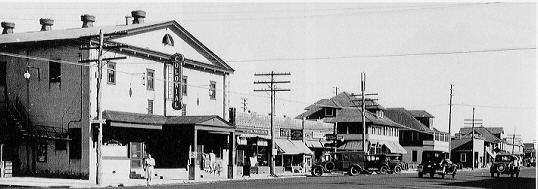
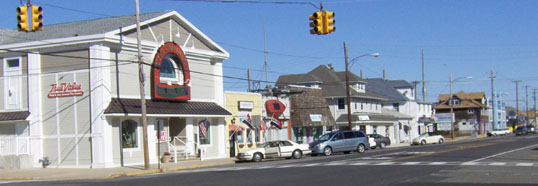
Interesting to note they were featuring the same three movies the Branchville was showing, but each played one day later at the Colonial. (We can’t help but wonder what the Colonial was showing on Friday, Nov. 12, 1937. The flyer doesn’t say.)
The last bijou on the flyer is the Park Theatre in Barnegat, New Jersey. Both the Barnegat and the Colonial (and, we’re guessing, the Branchville) were owned and operated by one Harry Colmer, who died in 1956. His family operated the theatres until 1964, when they sold them.
The Park, which opened in the early 1900s as the Barnegat Opera House, a venue for vaudeville and minstrel shows, began also showing movies between 1915 and 1920. It later became a full-time movie house under the new name. The Park Theatre, since demolished, was located on Shore Road in Barnegat, which is presently Route 9.
The weekend of Friday and Saturday, November 12th-13th, 1937, the Park was featuring Ali Baba Goes to Town, starring Eddie Cantor, Tony Martin, and Roland Young. That one we’d have to think twice about catching. We’d likely opt to drive the twenty miles over to Beach Haven to take in The Awful Truth or Angel at the Colonial (Branchville lies 142 miles away, a bit of a trek to catch a movie).
Snapshot in prose: Alice Faye
In this series, we’ll explore some career snapshots of familiar Cladrite-era performers, profiles and interviews written long ago that capture the individual at a particular time in his or her career.
The initial entry in the series dates from 1935 and puts the spotlight on the lovely and talented Alice Faye. She’d made only a handful of pictures at this point in time, and was still rumored to be “that way,” as Walter Winchell used to say, about Rudy Vallée. She had yet to wed (or perhaps even meet) Tony Martin, to whom she was married from 1937-1940, or Phil Harris, with whom she would build a long and happy life. They were happily married from 1941 until his death in 1995, and they raised two children together.
But at this point in time, in a profile first published in the June 1935 issue of Popular Songs magazine, Faye’s just hit the big time, with a great career still mostly in front of her.

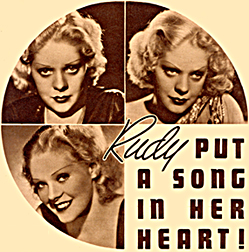 hat put the song in Alice Faye‘s heart? What made her change the personality that was hers as a dancer in a night club? Was it her meeting with Rudy Vallee?
hat put the song in Alice Faye‘s heart? What made her change the personality that was hers as a dancer in a night club? Was it her meeting with Rudy Vallee?
I saw Alice Faye recently when she came back from Hollywood on a visit. She had come to the NBC studios to see Rudy and the Connecticut Yankees.
Imagine the delicious curves of her figure emphasized by a chic and tight gown, a little black hat perched over one eye, lithe legs encased in silver silk—and her hair—dozens of little corncolored ringlets curving around those come-hither eyes and pointing to that seductive mouth.
The boys were frankly crazy about her for they crowded about, asking her questions and telling her how glad they were to have her back with them again.
This was Alice Faye of 1935.
Now let us take you back to the Alice of but three years ago.
Do you remember the song?
|
That, my lads and lassies, is an excellent description of the Alice-that-was just a few years ago, an Alice that was coy and sweet, who had medium brown hair that coiled up the back of her neck, who never rouged unless unless she had to and who was afraid of her own shadow.
What transformed the demure little lass with the cast-down eyes into the “hot” blondlined torch singer of the arched eyebrows and the come-hither gaze in her orbs?
It was while the Scandals of 1932 were playing in New York city that Alice Faye met Rudy Vallee. Not really “met” him, mind you, but came face to face with him. For Rudy in 1932 was already sitting on his throne and Alice was just another chorus girl who had yearnings to be something better someday.
Here is Rudy Vallee, a top-notcher on the stage, whispering musical nothings into the shell like ear of Ethel Merman, his co-star. Watching them, her eyes glued on the pair, is a little obscure dancer named Alice Faye whose soul burns and seethes with ambition to rise to stellar heights.
And Rudy probably never knows of her existence, never knows that soon she will be the leading singer in his band, and some say of his heart as well.
It is a long cry now from Alice the chorus girl. Her childhood days spent somewhere in New York city, where she was born, foresaw nothing of the girl who would some day become a dancer in a night club or a red-hot singer of the blues.
Alice worked hard at the Chester Hale Ballet School which she entered right after her graduation from high school. She was the most conscientious pupil they had. She came for her lessons and left when they were over.
From Chester Hale’s, she graduated into a job at the Palais Royal. Theer again it was all work, no play with her. Other girls may have hung around after closing hours, may have flirted and dated with some of the customers, but not Alice Faye. Her thoughts were on a dancing career.
Read More »
